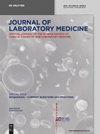The DKTK EXLIQUID consortium – exploiting liquid biopsies to advance cancer precision medicine for molecular tumor board patients
IF 1.8
4区 医学
Q4 MEDICAL LABORATORY TECHNOLOGY
引用次数: 2
Abstract
Abstract Testing for genetic alterations in tumor tissue allows clinicians to identify patients who most likely will benefit from molecular targeted treatment. EXLIQUID – exploiting liquid biopsies to advance cancer precision medicine – investigates the potential of additional non-invasive tools for guiding therapy decisions and monitoring of advanced cancer patients. The term “liquid biopsy” (LB) refers to non-invasive analysis of tumor-derived circulating material such as cell-free DNA in blood samples from cancer patients. Although recent technological advances allow sensitive and specific detection of LB biomarkers, only few LB assays have entered clinical routine to date. EXLIQUID is a German Cancer Consortium (DKTK)-wide joint funding project that aims at establishing LBs as a minimally-invasive tool to analyze molecular changes in circulating tumor DNA (ctDNA). Here, we present the structure, clinical aim, and methodical approach of the new DKTK EXLIQUID consortium. Within EXLIQUID, we will set up a multicenter repository of high-quality LB samples from patients participating in DKTK MASTER and local molecular tumor boards, which use molecular profiles of tumor tissues to guide targeted therapies. We will develop LB assays for monitoring of therapy efficacy by the analysis of tumor mutant variants and tumor-specific DNA methylation patterns in ctDNA from these patients. By bringing together LB experts from all DKTK partner sites and exploiting the diversity of their particular expertise, complementary skills and technologies, the EXLIQUID consortium addresses the challenges of translating LBs into the clinic. The DKTK structure provides EXLIQUID a unique position for the identification of liquid biomarkers even in less common tumor types, thereby extending the group of patients benefitting from non-invasive LB testing. Besides its scientific aims, EXLIQUID is building a valuable precision oncology cohort and LB platform which will be available for future collaborative research studies within the DKTK and beyond.DKTK EXLIQUID联盟-利用液体活检推进分子肿瘤板患者的癌症精准医学
摘要:检测肿瘤组织中的基因改变使临床医生能够识别最有可能从分子靶向治疗中受益的患者。EXLIQUID -利用液体活检来推进癌症精准医疗-研究了指导治疗决策和监测晚期癌症患者的其他非侵入性工具的潜力。术语“液体活检”(LB)是指对肿瘤来源的循环物质(如癌症患者血液样本中的无细胞DNA)进行非侵入性分析。尽管最近的技术进步使得LB生物标志物的敏感和特异性检测成为可能,但迄今为止只有少数LB检测进入临床常规。EXLIQUID是德国癌症联盟(DKTK)的一个联合资助项目,旨在建立LBs作为分析循环肿瘤DNA (ctDNA)分子变化的微创工具。在这里,我们介绍了新的DKTK EXLIQUID联盟的结构、临床目的和方法。在EXLIQUID中,我们将建立一个多中心的高质量LB样本库,这些样本来自参加DKTK MASTER和局部分子肿瘤委员会的患者,利用肿瘤组织的分子谱来指导靶向治疗。我们将开发LB检测,通过分析这些患者的肿瘤突变变体和肿瘤特异性DNA甲基化模式来监测治疗效果。通过汇集DKTK所有合作伙伴的LB专家,并利用他们的特殊专业知识、互补技能和技术的多样性,EXLIQUID联盟解决了将LB转化为临床的挑战。DKTK结构为EXLIQUID提供了一个独特的位置,即使在不太常见的肿瘤类型中也能识别液体生物标志物,从而扩大了从非侵入性LB检测中受益的患者群体。除了其科学目标,EXLIQUID正在建立一个有价值的精确肿瘤队列和LB平台,该平台将用于DKTK内外的未来合作研究。
本文章由计算机程序翻译,如有差异,请以英文原文为准。
求助全文
约1分钟内获得全文
求助全文
来源期刊

Journal of Laboratory Medicine
Mathematics-Discrete Mathematics and Combinatorics
CiteScore
2.50
自引率
0.00%
发文量
39
审稿时长
10 weeks
期刊介绍:
The Journal of Laboratory Medicine (JLM) is a bi-monthly published journal that reports on the latest developments in laboratory medicine. Particular focus is placed on the diagnostic aspects of the clinical laboratory, although technical, regulatory, and educational topics are equally covered. The Journal specializes in the publication of high-standard, competent and timely review articles on clinical, methodological and pathogenic aspects of modern laboratory diagnostics. These reviews are critically reviewed by expert reviewers and JLM’s Associate Editors who are specialists in the various subdisciplines of laboratory medicine. In addition, JLM publishes original research articles, case reports, point/counterpoint articles and letters to the editor, all of which are peer reviewed by at least two experts in the field.
 求助内容:
求助内容: 应助结果提醒方式:
应助结果提醒方式:


